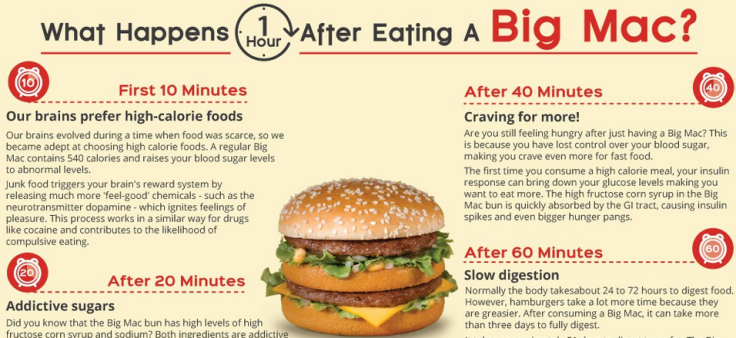The Effects Of Fast Food On The Body: Eating A Big Mac May Increase Blood Sugar Levels, Hunger Pangs

We all know what happens to our bodies when we drink a can of coke, or mix alcohol and energy drinks. Now, a new infographic from Fast Food Menu Price, reveals the significant toll a McDonald’s Big Mac can have on our bodies just an hour after eating it.
The 7.5-ounce iconic burger consists of 540 calories, 240 of which are fat. According to the infographic, the burger can cause a spike in our blood sugar levels while increasing the likelihood of compulsive eating after just 10 to 20 minutes. However, claiming that our blood sugar will climb to “abnormal levels” is only partially true. This is because the fat from a Big Mac can slow down how food is emptied from the stomach and digested into the bloodstream. But that’s not to say there’s no risk from eating the food; the carbohydrates in it still cause spikes to insulin levels, which increase insulin resistance — a precursor to diabetes. A 2012 study found that eating fast food just two or more times a week could increase the risk of developing type 2 diabetes by 27 percent in healthy people.
The sodium levels in a Big Mac (970 milligrams) are also a cause for concern, since the amount in one Big Mac is 42 percent of the daily recommended salt limit. We can safely consume 2,300 milligrams of sodium a day, or 1 teaspoon per day, according to the Cleveland Clinic. Though we often mistake dehydration for hunger, there are many factors that can affect whether one Big Mac causes dehydration, including exercise, medical history, and our current state of hydration.
If you are hydrated, then there’s another reason you might crave seconds 40 minutes after eating a Big Mac. The trans-fats (1.5 grams in Big Mac) in fast food usually inflame the gut and interfere with the body’s ability to produce appetite-controlling neurotransmitters, such as dopamine and serotonin, according to a 2009 study published in The Journal of Clinical Investigation. The GI tract also begins to absorb the high fructose corn syrup found in the buns and condiments, which in turn leads to the aforementioned insulin spikes, as well as hunger pangs.
Indulging in a Big Mac every so often won’t kill you, but eating it on a regular basis can have consequences for your health.
Published by Medicaldaily.com



























